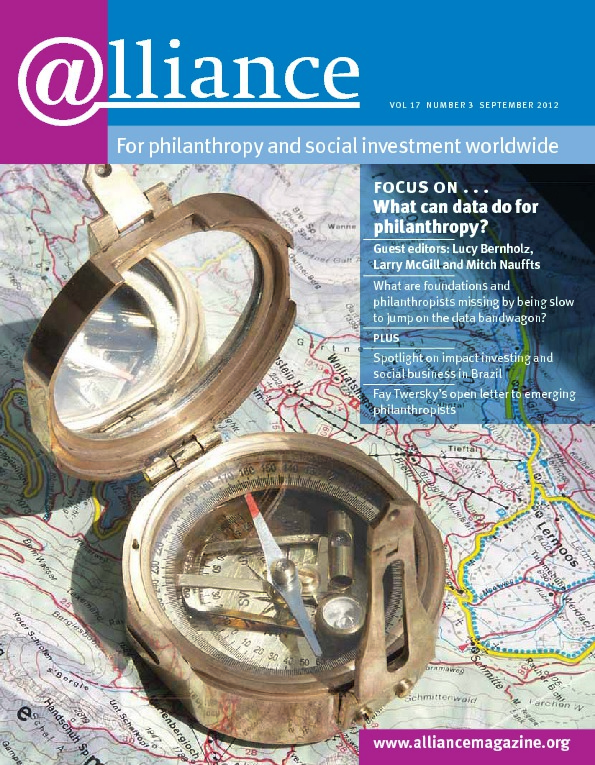The UN Conference on Sustainable Development that took place in Brazil from 20 to 22 June (Rio+20) was the biggest UN conference ever. Over 100 governments were represented at the head of state level. Nearly 500 ministers and 40,000 participants flew into town along with staff from scores of foundations. But what was achieved and what happens next? As the preparations begin for September’s opening of the UN General Assembly, which will follow up on Rio+20, what are the implications for foundations and philanthropists?
Rio+20 was a complex series of linked gatherings – an insiders’ or official government part and a more amorphous informal part comprising thousands of dialogues, side events and commitments showcased all over Rio by civil society leaders, progressive businesses, cities and parliamentarians to name a few.
The official negotiations between governments were beset with problems. They were not resourced well and lacked a coherent negotiating structure. Too many significant developed country leaders went to the G20 but failed to turn up at Rio. Their absence demonstrated conclusively that the most powerful countries are not listening to their scientists. Too many leaders still do not understand that fixing a broken global financial and economic system is not possible without also safeguarding the planet.
The informal gatherings also faced difficulties. Divisions and mistrust prevailed within civil society, while foundations did not do enough to catalyse the kinds of new alliances needed to challenge vested interests committed to business as usual. Sadly for the planet, and the world’s most vulnerable peoples, no ‘coalition of the willing’ emerged, inside or outside Rio’s conference halls, to champion a new vision of development that integrates social, developmental and ecological imperatives.
Finally, ignoring the nearly 50,000 people who marched through Rio for greater social and ecological justice, Brazil issued a final ‘outcome’ document called The Future We Want a full day before leaders and ministers even arrived in Rio. All major groups rightly judged this document to be a very low ‘lowest common denominator’.
But there are some positive aspects to the document. It provides an agreed platform to move forward when a complete reversal of the gains from the 1992 Earth Summit might well have occurred. It sets up a new high-level forum that could in time make good the failures of the Commission for Sustainable Development. And it gives a green light to intensify negotiations that might result in new sustainable development goals (SDGs) being agreed by 2015.
Perhaps the most positive thing of all is the sheer amount of creative energy and buzz outside the formal negotiations. A huge diversity of actions were launched by civil society actors, universities, parliamentarians, mayors, local government officials and the private sector, many backed by foundations and philanthropists. Over 700 voluntary pledges – some ground-breaking and experimental, but many not – have been recorded by the UN Rio+20 Secretariat, with over $500 billion worth of committed funding for sustainable development, including the UN-backed Sustainable Energy for All.[1]
So why was there such a big disconnect between citizens and governments? Why are our governments and multilateral processes moving at a snail’s pace on sustainable development? What is needed now to secure a future we all want, locally, nationally and internationally?
Like other actors, foundations and philanthropists need to pause and reboot their sustainable development efforts. Environmental philanthropy still remains critically under-resourced compared to other fields such as the arts. Most foundations are overly focused on using the 5 per cent of their resources better rather than using the 95 per cent tied up in their endowments, large parts of which shore up socially and environmentally destructive ‘business as usual’ practices.
A shift in culture and values is needed too. Diversity and freedom to act according to personal choice are a huge strength of philanthropy. But they also result in fragmentation and ad hoc efforts that cancel each other out. More joined-up thinking and coordination among foundations is needed to tackle the systemic challenges ahead. Philanthropy must step up to the plate in a much bigger, more strategic and more coordinated way. Greater strategic coordination of insider and outsider tracks, in particular, will be required from now to 2015 if governments are collectively to deliver on their modest Rio promises, let alone play their part in scaling up and taking forward the myriad initiatives launched by others.
1 http://www.uncsd2012.org/content/documents/790Summary%20of%20Voluntary%20Commitments%20Registered%20at%20Rio20%20v6.pdf
Farhana Yamin is a consultant on climate change at the Children’s Investment Fund Foundation (CIFF). Email FYamin@ciff.org.
The views expressed in this article are personal and are not necessarily endorsed by CIFF.






Comments (0)